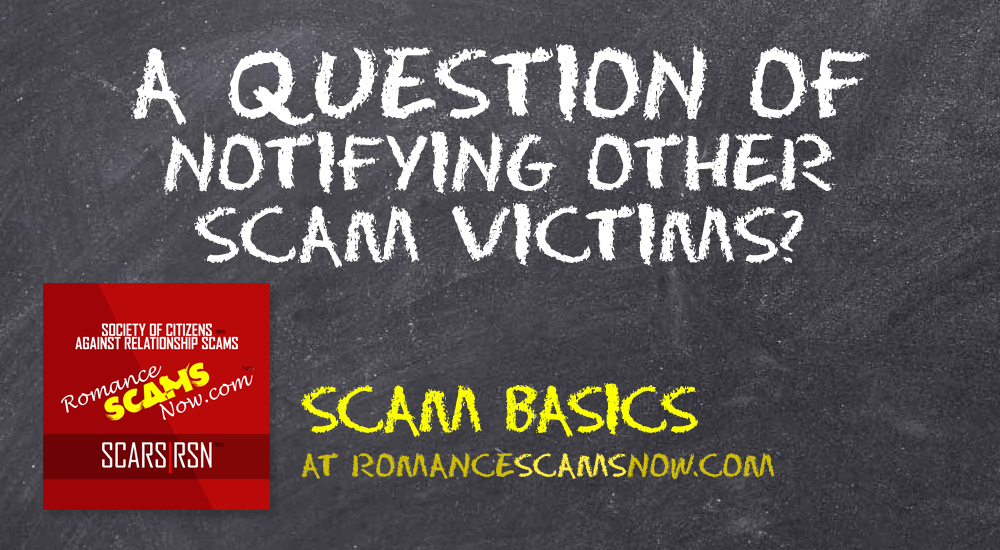SCARS™ Scam Basics: The Ethics Of Warning Other Victims
Many Victims Find Still Other Victims When Hunting For Scammers Online. Is It A Good Idea To Warn Them That They Are Being Scammed?
This is an interesting ethical question and it depends on the context of the situation.
There are two types of victims that you will likely encounter out there in social media:
- Scam Victims – involved in or being groomed to be a victim by the scammer
- Scam Money Mules – participating in the scam and engaged in money laundering – usually, without any idea that they are doing it
SCAM VICTIMS
When you are viewing a typical fake or scammer social media profile you will see a number of people commenting or engaging with the scammer and your first impulse is to warn them.
Unfortunately, their reactions may not be what you would expect. If they are fully engaged with the scammer – meaning in the relationship, then you are going to appear hostile to them and their relationship. If they are more casual then alerting them can help create a better outcome, but the problem is how to know?
Additionally, alerting strangers that you see on a fake profile can have consequences to you personally. They can report you to the social media platform – this can result in suspension or loss of your account.
Therefore, what we recommend is to “TAG” the profile as fake and let the victims decide for themselves.
How to TAG?
- First, make sure that your personal profile is locked down and that only your friends can see anything – so that you are not leading a trail of bugs back to your home, family, and friends
- Next, post a graphic that identifies the profile as fake – this can be done in a comment very easily – especially a comment on a scammer’s post that has a lot of victim activity.
Here is the graphic we recommend:
You can download this graphic here: https://romancescamsnow.com/wp-content/uploads/2019/02/hello-my-name-is-fake-profile-bomb.png
YOU ARE FREE TO POST IT ON SOCIAL MEDIA PROFILES THAT ARE FAKE
We call these “Fake Bombs.” It is the best way to TAG a profile as being fake and generally, the scammers will not even see them. Worse case they will block you. But this is very visual and a clear warning to those already on the profile and those that come later (assuming it survives).
In the end, it is a better solution and just remember, that we do only what we can do!
MONEY MULES
Why do this?
So you see that in reality, it is better to let the police deal with MULES.
ETHICS MATTERS IN WHAT WE ALL DO!
PLEASE SHARE OUR ARTICLES WITH YOUR CONTACTS
HELP OTHERS STAY SAFE ONLINE
SCARS™ Team
A SCARS Division
Miami Florida U.S.A.
TAGS: Ethics, Money Mules, Money Laundering, Police Action, Scam Victims, Alerting Victims, Tag Fake Profiles, Tagging Fakes, Fake Social Media Profiles, Social Media Accounts, Scams, Scammers,
END
MORE INFORMATION
– – –
Tell us about your experiences with Romance Scammers in our Scams Discussion Forum on Facebook »
– – –
FAQ: How Do You Properly Report Scammers?
It is essential that law enforcement knows about scams & scammers, even though there is nothing (in most cases) that they can do.
Always report scams involving money lost or where you received money to:
- Local Police – ask them to take an “informational” police report – say you need it for your insurance
- Your National Police or FBI (www.IC3.gov »)
- The SCARS|CDN™ Cybercriminal Data Network – Worldwide Reporting Network HERE » or on www.Anyscam.com »
This helps your government understand the problem, and allows law enforcement to add scammers on watch lists worldwide.
– – –
Visit our NEW Main SCARS Facebook page for much more information about scams and online crime: www.facebook.com/SCARS.News.And.Information »
To learn more about SCARS visit www.AgainstScams.org
Please be sure to report all scammers HERE » or on www.Anyscam.com »
Legal Notices:
All original content is Copyright © 1991 – 2020 SCARS All Rights Reserved Worldwide & Webwide. Third-party copyrights acknowledge.
SCARS, RSN, Romance Scams Now, SCARS|WORLDWIDE, SCARS|GLOBAL, SCARS, Society of Citizens Against Relationship Scams, Society of Citizens Against Romance Scams, SCARS|ANYSCAM, Project Anyscam, Anyscam, SCARS|GOFCH, GOFCH, SCARS|CHINA, SCARS|CDN, SCARS|UK, SCARS Cybercriminal Data Network, Cobalt Alert, Scam Victims Support Group, are all trademarks of Society of Citizens Against Relationship Scams Incorporated.
Contact the law firm for the Society of Citizens Against Relationship Scams Incorporated by email at legal@AgainstScams.org







Leave A Comment